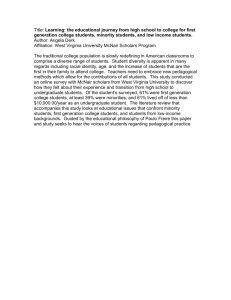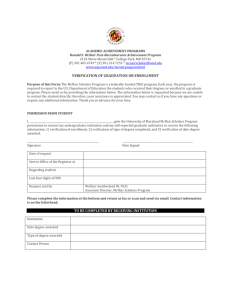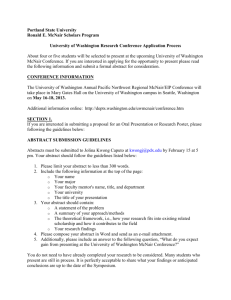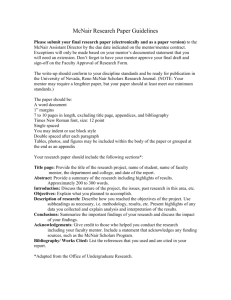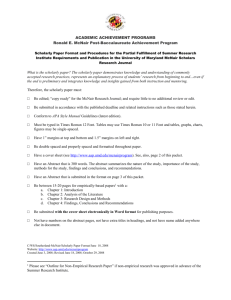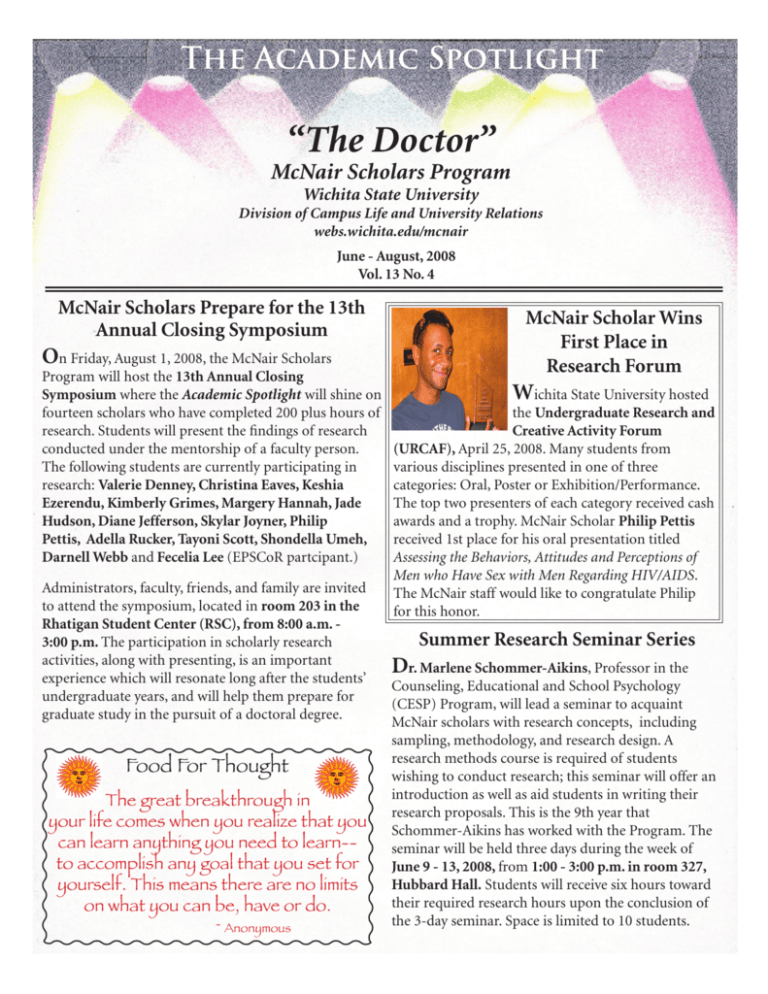
The Academic Spotlight
“The Doctor”
McNair Scholars Program
Wichita State University
Division of Campus Life and University Relations
webs.wichita.edu/mcnair
June - August, 2008
Vol. 13 No. 4
McNair Scholars Prepare for the 13th
Annual Closing Symposium
On Friday, August 1, 2008, the McNair Scholars
Program will host the 13th Annual Closing
Symposium where the Academic Spotlight will shine on
fourteen scholars who have completed 200 plus hours of
research. Students will present the findings of research
conducted under the mentorship of a faculty person.
The following students are currently participating in
research: Valerie Denney, Christina Eaves, Keshia
Ezerendu, Kimberly Grimes, Margery Hannah, Jade
Hudson, Diane Jefferson, Skylar Joyner, Philip
Pettis, Adella Rucker, Tayoni Scott, Shondella Umeh,
Darnell Webb and Fecelia Lee (EPSCoR partcipant.)
Administrators, faculty, friends, and family are invited
to attend the symposium, located in room 203 in the
Rhatigan Student Center (RSC), from 8:00 a.m. 3:00 p.m. The participation in scholarly research
activities, along with presenting, is an important
experience which will resonate long after the students’
undergraduate years, and will help them prepare for
graduate study in the pursuit of a doctoral degree.
Food For Thought
The great breakthrough in
your life comes when you realize that you
can learn anything you need to learn-to accomplish any goal that you set for
yourself. This means there are no limits
on what you can be, have or do.
~ Anonymous
McNair Scholar Wins
First Place in
Research Forum
Wichita State University hosted
the Undergraduate Research and
Creative Activity Forum
(URCAF), April 25, 2008. Many students from
various disciplines presented in one of three
categories: Oral, Poster or Exhibition/Performance.
The top two presenters of each category received cash
awards and a trophy. McNair Scholar Philip Pettis
received 1st place for his oral presentation titled
Assessing the Behaviors, Attitudes and Perceptions of
Men who Have Sex with Men Regarding HIV/AIDS.
The McNair staff would like to congratulate Philip
for this honor.
Summer Research Seminar Series
Dr. Marlene Schommer-Aikins, Professor in the
Counseling, Educational and School Psychology
(CESP) Program, will lead a seminar to acquaint
McNair scholars with research concepts, including
sampling, methodology, and research design. A
research methods course is required of students
wishing to conduct research; this seminar will offer an
introduction as well as aid students in writing their
research proposals. This is the 9th year that
Schommer-Aikins has worked with the Program. The
seminar will be held three days during the week of
June 9 - 13, 2008, from 1:00 - 3:00 p.m. in room 327,
Hubbard Hall. Students will receive six hours toward
their required research hours upon the conclusion of
the 3-day seminar. Space is limited to 10 students.
Grammatically Speaking
Preventing Plagiarism
Plagiarism is a difficult concept to define. It includes
a range of actions from failure to use proper citation
to wholesale cheating. A student who plagiarizes is one
who unintentionally or deliberately adopts or
reproduces ideas, words, or statements that are
another person’s ideas without acknowledging the
source. Accidental plegiarism occurs when a writer
fails to cite sources completly or accurately. Below are
tips for avoiding plagiarism.
Tips for Avoiding Accidental Plegiarism
•
Take careful notes. Be sure you have recorded
information from your sources carefully and
accurately.
•
In your notes, put all words borrowed from
sources inside circled quotation marks, “for
example” , and enclose your own comments
within brackets ([]).
•
In your paper, differentiate your ideas from
those of your sources by clearly introducing
borrowed material with a running
acknowledgement and by following it with
documentation.
•
Enclose all direct quotations used in your
paper within quotation marks.
•
Review paraphrases and summaries in your
paper to make certain they are in your
own words and that any distinctive words and
phrases from a source are quoted.
•
Document all quoted material and all
phrases and summaries of your sources.
•
Document all facts that are open to dispute or
are not common knowledge.
•
Document all opinions, conclusions, figures,
tables, statistics, graphs and charts taken
from a source.
Sources: [Kirszner, Laurie G., and Stephen R. Mandell. The Holt Handbook.
Boston: Thomson, 2002.] & ©2000 by the Regents of the University of Minnesota
-- Twin Cities. University Libraries. All rights reserved. URL: http://tutorial.lib.
umn.edu/Updated: 9/1/99
Congratulations to our McNair Scholars
2007 - 2008 Undergraduates
Roni Ayalla - BA Communications
Christina Bower (Alum) - BS Biological Sciences &
BA Psychology
Valerie Denney - BA Fine Arts
Steven Hernandez - BA Business Administration
Jade Hudson - BA English
Diane Jefferson - BA Social Work
Skylar Joyner - BA Social Work
Kayla Nash (Alum) - BA Spanish &
BS Criminal Justice
Mikki Phan - BA Psychology
Shondella Umeh - BA General Studies
2007 - 2008 Masters Degrees
Meladee Garst (Alum) - Educational Psychology
Counseling
Brandi Newry (Alum) - Educational Specialist’s
Degree School Psychology
Students Entering Graduate Programs
Roni Ayalla - Masters Digital Media
University of Washington
Valerie Denney - Masters Art Therapy
Emporia State University
Jerry Elmore (Alum) - Masters Library Science
Emporia State University
Marissa Higinio (Alum) - Masters of Public
Health Administration
University of Kansas
Jade Hudson - Masters English
Miami University of Ohio
Diane Jefferson - Masters Social Work
University of Oklahoma
Skylar Joyner - Masters Social Work
University of Oklahoma
Kayla Nash (Alum) - Masters Public Administration
Louisiana State University
Mikki Phan - PhD Human Factors Psychology
Wichita State University
That & Which: which is best to Use?
“That” restricts the reader’s thought, directing attention
to a specific bit of information to complete a message’s
meaning.
6
June
Restrictive clauses (“that”) modify, focus, and limit.
Because the information they supply is essential to the
intended meaning of sentences, they are not set off by
commas.
The lawnmower that is in the garage needs
sharpening.
Events to Come
Note: Restrictive and non-restrictive clauses need not
begin with “that” and “which.” For example, if humans or
animals with names are being discussed, “who” may
become the appropriate choice for both kinds of clauses.
In such cases, a comma all by itself can transform the
meaning of the sentence.
He helped the native guides who were sick with
malaria. (restrictive clause--no comma. Not all
guides had malaria)
He helped the native guides, who were sick with
malaria. (non-restrictive clause--comma. All
guides were sick with malaria)
Source: That & Which: http://web.ku.edu/~edit/which.html
Happy Birthday!
The staff would like to wish a Happy Birthday to those
who are celebrating birthdays this summer.
Shukura Bakari-Cozart 6/19
Keshia Ezerendu 6/26
Tayoni Scott 6/29
Shannon Ray 6/30
LaWanda Holt-Fields 7/2
Philip Pettis 7/28
Darnell Webb 7/28
Krystal Brack 8/17
August
“Which” is non-restrictive and introduces subsidiary
rather than essential information to the meaning of the
sentence.
July
Non-restrictive clauses (“which”) do not limit the words
they modify; they simply add information that otherwise
would not be provided. Non-restrictive clauses are set off
by commas because the information they provide is
supplementary, not essential to the meaning of the
sentence.
The lawnmower, which is in the garage, needs
sharpening.
Research Assembly Meeting (RAM)
Kyle Little, McNair Research Coordinator
“Writing & Editing”
2 - 3 p.m., room 106, DV
Abstract Rough Draft Due
9 - 13 Summer Research Seminar
Dr. Marlene Schommer-Aikins
1 - 3 p.m., room 328, HH
20
Final Abstract Due
27
Summary Rough Draft Due
3
Final Summary Due
4
Independence Day! No Classes
11
Research Assembly Meeting (RAM)
LaWanda Holt-Fields
“Presentation Skills”
2 - 3 p.m., room 106, DV
Manuscript Rough Draft Due
14 -24 Mock Presentations
18
Poster Board Approval
23
Final Manuscript Due for
Publication Consideration
1
14th Annual Closing Symposium
All Research Paperwork is Due
18
McNair Student Orientation
1 - 3 p.m., room 106 DV
Someone Like Me?
Dr. William T. Hoston, Professor,
Political Sciences, Wichita State University, Wichita, Kansas
William T. Hoston was born in Queens, New York. Raised in a single-parent
household, his mother has been the foundation of his success. His mother, Janet Smith,
entered the United States Navy when he was only two years old. As a child, Hoston
traveled around the United States, which exposed him to different cultures and groups
of people. This, he believes, has translated into his ability to adapt to new environments.
Hoston and his mother relocated to New Orleans when he was 13 years of age. He
attended Belle Chasse High School, a predominantly white high school, where he acclimated himself by
becoming Who’s Who Among American High School Students and a standout football player.
Hoston first entered college on a football scholarship to Nicholls State University. At Nicholls State, much of his
focus was on football, which was reflected in his early grades (earning a 1.93 in his first semester and 1.50 the
following semester.) Due to family issues, Hoston eventually quit football and dedicated himself to finishing his
degree. He spent a short stint in Oxnard, California, but eventually returned to Louisiana and attended the
University of New Orleans. It was at the University of New Orleans that Hoston realized he wanted to go to
graduate school and sought out the advice of many of his professors. It was two professors, Drs. Ralph Thayer
and Peter Anderson, who highly encouraged him to take the Graduate Records Exam (GRE) and apply to
graduate school.
After earning his bachelor’s degree in general studies from the University of New Orleans, Hoston attended
Florida State University and earned his master’s degree in criminal justice in one year. While serving as a
graduate assistant at FSU, he fell in love with teaching and soon became an instructor after receiving his master’s
degree. This introduction to higher education propelled his desire to become a professor, either teaching
criminal justice or law.
Hoston contemplated going to law school before deciding to pursue the Ph.D. in criminology and criminal
justice. However, that decision was quickly questioned; it was at FSU that he first faced different forms of
institutional prejudice and discrimination as a graduate student. For example, Hoston had to challenge the
grading of several professors; he was told he was not doctoral material, and fought to complete his master’s
thesis on the subject of gangsta rap music. He failed the Ph.D. general exams by one point, which prevented him
from completing his doctoral program.
After taking a short break from graduate studies, Hoston returned to another Ph.D. program at the University of
New Orleans in political science. Starting from scratch, he realized the importance of having a Ph.D. and
persevered, stating “quitting was not an option.” Although temporarily displaced by Hurricane Katrina in
August of 2005, Hoston completed his Ph.D. in December of 2007.
Today, Hoston is an assistant professor in the Department of Political Science at Wichita State University in
Kansas. He is a dedicated and enthusiastic teacher who teaches a wide variety of classes. Hoston provides these
words of wisdom, “People will remember you not by what you say, but by what you do.” His motto is “I just
want to be an example. Many have come before me and hopefully those that come after will be inspired by the
example that I have set.”
GRAD-CONNECT
“How to Get the Most out of an Internship”
As students prepare for graduate school, many take the opportunity to participate in an internship to gain
hands-on work experience and training, as well as personal and academic development. Choosing a good
internship requires a bit of research to ensure that the experience is positive and rewarding. Below are points to
consider when searching for internships.
What is an Internship?
An internship is a position which allows a student to gain professional experience in an occupational area they
are considering. Typically the experience has a level of responsibility that allows a student to develop new skills in
the field and offers training and supervision that facilitates learning. Internships can be both paid and non-paid
experiences.
Not all Internships are equal:
An intern is not a source of cheap, routine labor. Regardless of the organization and the position, the internship
must follow certain guidelines in order to qualify. It must be a supervised position that provides professional
development for the intern. This includes training, feedback, and exposure to the workplace environment and
expectations. An internship should not consist of routine, clerical tasks, but specific projects that relate to the
intern’s area(s) of professional interest.
Why get an Internship?
Just a decade ago internships were considered useful but not a necessity. Today, students are at a competitive
disadvantage in the job market if they do not have one (Oldman & Hamadeh 2004). Vault reported in 2003 that
87% of US college students have completed at least one internship by graduation; 70% had two or more
internship experiences. Among numerous advantages, internships:
• Allow students to test out or develop necessary skills in his or her area of study.
• Give opportunities to break into the field.
• Are an excellent resume builder.
• Allow students to gain exposure to an employer and its organizational culture.
• Help to establish mentoring and networking opportunities.
• Open up the possibility of full-time employment upon graduation (the employer is giving students a “test
run” to see how they perform).
Things to consider when searching for internships:
• What will be the duration of the internship?
• What do the responsibilities include? How will these responsibilities contribute to your overall professional and
career development?
• Who will be your supervisor? How, specifically, will this supervisor provide guidance and support?
• What will be the responsibilities of the supervisor in terms of training and feedback?
• What mechanisms will be in place to ensure communication between you and the supervisor(s)?
• What precisely will be expected of you in terms of your conduct and contributions?
• What will your work schedule be? What mechanisms will be in place in case you need to take time off or are
unable to complete the full term of the internship position?
• How will you be evaluated in terms of growth and performance?
• What is the organization’s policy on liability? In what ways does it cover you, and what steps will be necessary
for you to insure your own protection?
Sourecs: http://www.stpaulcareers.umn.edu/internship_experience/internship.html/University of Minnesota, St Paul Career Center.
http://honors.uoregon.edu/opportunities/internships_and_mentorships/internships/experience/
Wichita State University
McNair Scholars Program
1845 N. Fairmount
Wichita, KS 67260-0199
Inside....
- 13th Annual Closing Symposium
- McNair Scholar Presents Research
- Grammatically Speaking
- McNair Graduates
- Someone Like Me?
- Grad-Connect
- Events to Come
The WSU McNair Program would
like to welcome Kyle Little, a
Creative Writing graduate student
in the English Department. Little
will serve as the Research
Coordinator during the summer
months assisting students with preparing their
research manuscripts for publication.
“Of all the properties which belong to honorable
men, not one is so highly prized
as that of character.”
~ Henry Clary
Currently, there are
180 McNair Scholars
Programs around the
country, serving first
generation, limited
income and
underrepresented
college students.
Wichita State
University’s McNair
Program has served
nearly 200 college
students since 1995.
McNair Facts
Did You Know?
“The Doctor”
McNair Scholars Program
Wichita State University
Grace Wilkie Annex, Room 173B
Campus Box 199
Wichita, KS 67260-0199
phone: (316) 978-3139
fax: (316) 978-3439
e-mail: shukura.cozart@wichita.edu
Shukura Bakari-Cozart, Editor
web site: webs.wichita.edu/mcnair
Staff:
LaWanda Holt-Fields, Director
Shukura Bakari-Cozart, Assistant Director/Counselor
Sr. Administrative Assistant, Vicki Alfred
NOTICE OF NON-DISCRIMINATION
1. It is the stated policy of Wichita State University to prohibit discrimination in
employment and in educational programs and activities because of race, color, religion, gender,
age, marital status, national origin, sexual orientation, political affiliation, disabled/Vietnam-era
veteran status or physical or mental disability.
2. In working to achieve and maintain a welcoming and discrimination free environment,
it is necessary and appropriate that employees and students be encouraged to make
complaints and concerns about perceived discriminatory behaviors known to University
supervisors and officials.
3. Any University employee or student who in retaliatory conduct against a University
employee or student who has filed a complaint alleging discrimination or otherwise
exercised their rights and privileges against illegal discrimination will be subject to
disciplinary actions pursuant to establish University procedures up to and including
termination of employment or student status.
4. This prohibition against retaliatory conduct applies regardless of the merits of the initial
complaint of illegal discrimination.
The McNair Scholars Program us funded through the US Department of Education, for $252,045.

